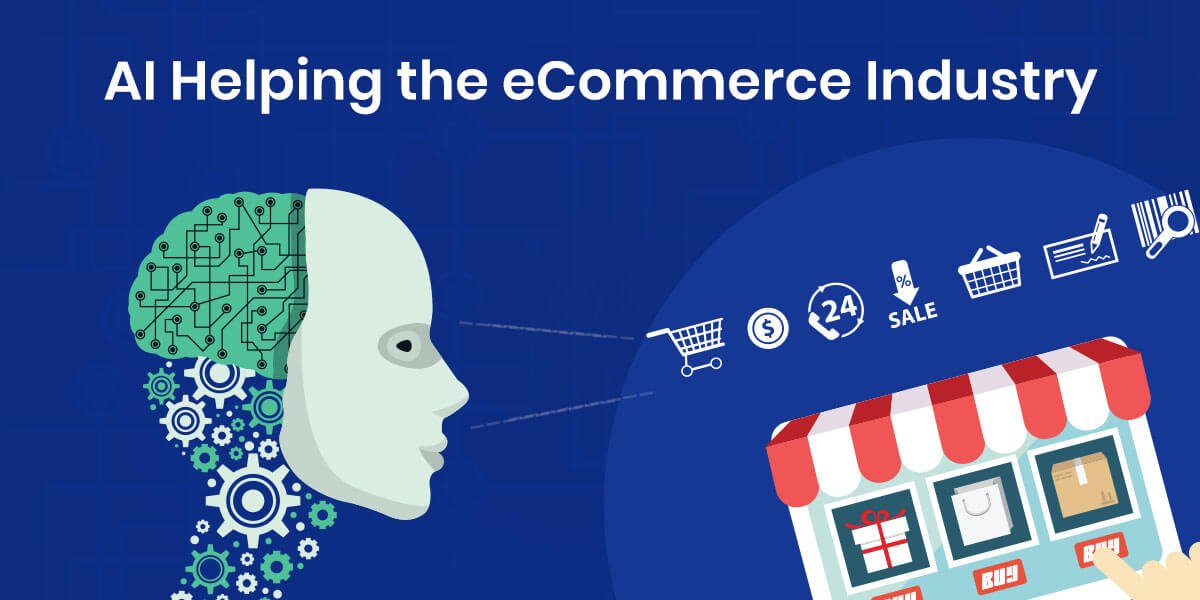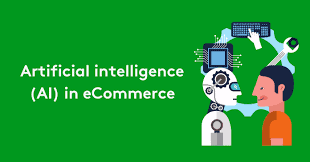E-commerce is changing fast. Smart shopping is a must-have, not a nice-to-have. Thanks to artificial intelligence (AI), we can make ecommerce apps smarter. This changes everything about how businesses work and how customers shop. Let’s explore this more.
The Role of Intelligence in E-commerce
Artificial intelligence is igniting an e-commerce revolution. It gives businesses the tools to understand what customers want and need. Then, it lets them shape shopping experiences to fit those needs. AI in e-commerce can do many things. Some examples include suggesting tailored product choices, predicting insights, using chatbots for interaction, and enabling visual searches.
AI has reshaped the e-commerce field. It helps us understand customers better. This leads to shopping experiences that feel personal to each customer. Machine learning and complex formulas make this individual approach possible. It makes customers happier and leads to more sales.
Plus, AI-powered predictive tools can guess what customers will do next. They use past data to make these guesses. This lets businesses plan their product range, pricing, and adverts to match what they think customers will want.
AI has boosted customer service with the help of chatbots. Providing round-the-clock support and instant help, they can handle a bunch of customer questions. Chatbots also guide shoppers and resolve issues quickly, making customers happier.
AI’s work doesn’t stop there, it’s also changing how we search for products with visual search technology. Now, customers can use images to find what they’re looking for, an intuitive and fun way to shop.
AI’s part in e-commerce is still changing, promising neat things for the future. Seeing these changes, businesses have to move fast and adapt to keep up in this quick-moving industry. Using AI can help improve customer experiences and give businesses a leg up.

Personalization: Understanding Each Customer’s Wants
Personalization is a big deal in e-commerce, it simply can’t be ignored. Smart e-commerce apps are shaking up online shopping by creating personalized experiences for every user. These platforms can understand and react to each customer’s unique behaviors from their interaction with the online marketplace.
What’s causing this change? Machine learning. With sophisticated algorithms, these apps can study and learn from a user’s browsing and purchase history. This allows e-commerce platforms to suggest products that match the customer’s interests and likes, increasing the chances of sales.
Smart apps offer more – they provide special deals that match customer’s specific shopping tastes. This improves connection with customers and boosts sales. Moreover, these apps can guess customer’s future needs based on past actions. This ability to predict plays a key role in meeting current demands and planning for future customer needs in advance.
Standing out in the competitive world of online shopping is all about customer loyalty. Offering such individualized shopping experiences makes a big difference. Hence, online shopping platforms that use AI and machine learning for custom-tailoring are more likely to succeed and keep their customers.
Predictive Analytics: Knowing and Predicting Customer Actions
Predictive analytics, a key feature of AI, uses old data to predict future customer moves. It’s like a magic ball that can tell customer favorites, buying trends, and shopping styles. This tech uses AI formulas to study past customer interactions, allowing businesses to shape their services accordingly.
Predictive analytics assists in refining multiple business tasks. By understanding a customer’s buying preferences, online shopping platforms can tweak their stock to match predicted demands. Additionally, it aids in adjusting pricing strategies to heighten income and secure a competitive stand in the market.
Predictive analytics, a tool for marketing campaigns, works wonders. It tailors promotions on likely customer interests. This not only saves businesses from ineffective broad campaigns but also enhances conversion rates with tailored, attractive offers.
Predictive analytics does more than understand customer behavior—it helps predict market trends. Businesses stay ahead by anticipating customer preferences and recognizing burgeoning trends. It allows them to alter strategies and services promptly, keeping up with competitors and customer needs.
In essence, predictive analytics is a strategic move. It increases operational efficiency and boosts sales. It helps e-commerce platforms fulfill customer needs and adjust to market changes.
Chatbots: Customer Service Simplified
Chatbots can seriously boost customer service experiences on e-commerce platforms. These AI-controlled digital agents, with superb natural language processing (NLP) abilities, can handle many customer service tasks. They can answer common questions, help customers in their buying journey, or guide them to suitable products.
Chatbots are unique due to their instant replies, contrasting traditional customer support. In a world craving immediate service, customers value speedy responses. Moreover, chatbots work 24/7, ensuring uninterrupted customer service, uninhibited by time zones or working hours.
Integrating chatbots has a practical benefit. They take care of everyday queries, liberating human staff. Now, they can concentrate on complicated client issues needing human insight or beyond chatbot abilities. It results in better task and resource management, enhancing service quality.
Chatbots’ role in customer service shines in e-commerce platforms. They provide quick, steady support, improving customer service. In turn, customer happiness increases, helping strengthen the business’s place in the market.
Still, improving the chatbot based on user interaction and feedback is vital. It ensures the fulfillment of customer expectations effectively. As tech advances, chatbots will keep evolving. They’ll become more refined, always changing the e-commerce customer service landscape.
Visual Search: Upgrading the Shopping Experience
Visual search technology in e-commerce causes a big shift in customer product discovery and interaction. Aptly named, this advanced tool lets shoppers use pictures, not text, to look for things. With AI’s help, these intelligent e-commerce apps understand the user’s image content. They promptly present relevant or similar products based on the visual input.
Seeking items online just got easier with this tech, no wordy descriptions are needed. Imagine this: You snap a shot of eye-catching shoes and in a few clicks, find the same or similar pairs online. Simple and fun, that’s what visual search brings to shopping.
Visual search also introduces customers to new items they may not have found before. It breaks away from traditional keyword searches, providing a view of all items available online. The result? Better visibility of products and discoveries.
Though still on the upswing, pioneers of visual search tech are already laying the foundations for a brighter, more visual future in online shopping. As AI and machine learning get better, we can expect a more precise and easy-to-use visual search. Changing a visual craving into an actual item could be as easy as pie. The future of visual search in online shopping holds great promises, offering a new spin to the customer’s experience.
What Lies Ahead for AI in Online Shopping
As AI improves, its potential in online shopping also expands. The future holds a lot of thrilling possibilities. Think accurate personalization strategies, strict predictive modeling, and better chatbot capabilities. Maybe even virtual shopping assistants. Your shopper picks items based on your taste and fresh data. This isn’t a crazy idea, it’s the kind of novelty we can expect from the path AI is taking in online shopping.
Smart AI will boost virtual shopping to another level. Think of virtual reality display rooms or augmented reality dressing rooms. The boundary between physical and online shopping will vanish. It will offer customers a smooth and engaging shopping encounter. AI will also help in managing store and supply chain tasks, predict what customers want better, handle stocks more efficiently, and speed up delivery.
Also, consider AI adjusting prices based on how customers behave, changes in demand, and what competitors are doing. This approach to pricing could keep businesses competitive and increase their profits.
Think about AI advancing so chatbots can have deeper, more context-aware chats. They’ll be just like talking to a real person. This would improve customer support and satisfaction in online shopping.
As we look to the future, it’s clear AI will revolutionize online shopping. It will introduce new ways to improve customer experience, streamline work, and stay competitive. The leaders will be businesses that use these advancements and imagine new ways to use AI in their online shopping strategy. The possibilities are huge, and the future of AI in online shopping is incredibly promising.
Conclusion
The integration of AI into online shopping apps goes beyond just enhancing UX. It’s also integral in understanding customers and meeting their needs in a proactive and personalized way. It’s about always being ahead in the race of the always-changing competitive market. As AI technology advances, it holds promise for intelligent and seamless shopping experiences.
AI’s capabilities to provide personalized shopping, predict behaviors, improve customer support with chatbots, and create an engaging shopping experience through visual search emphasize its transformative effect on the online shopping sphere.
As we look to the future, businesses should adopt these advancements and explore inventive ways to apply AI in their online shopping strategies. This intersection of AI and online shopping is more than a trend, it’s a route to create deeper relationships with customers, enhance efficiencies, and gain a competitive edge. The progress of AI is definite, and its future in online shopping is very promising, providing numerous possibilities for both businesses and consumers.
Albert Smith is Digital Marketing Manager at Hidden Brains, a leading software development company specializing in mobile & web app development services. He provides innovative ways to help tech companies, startups and large enterprises build their brand.






















































































































































































